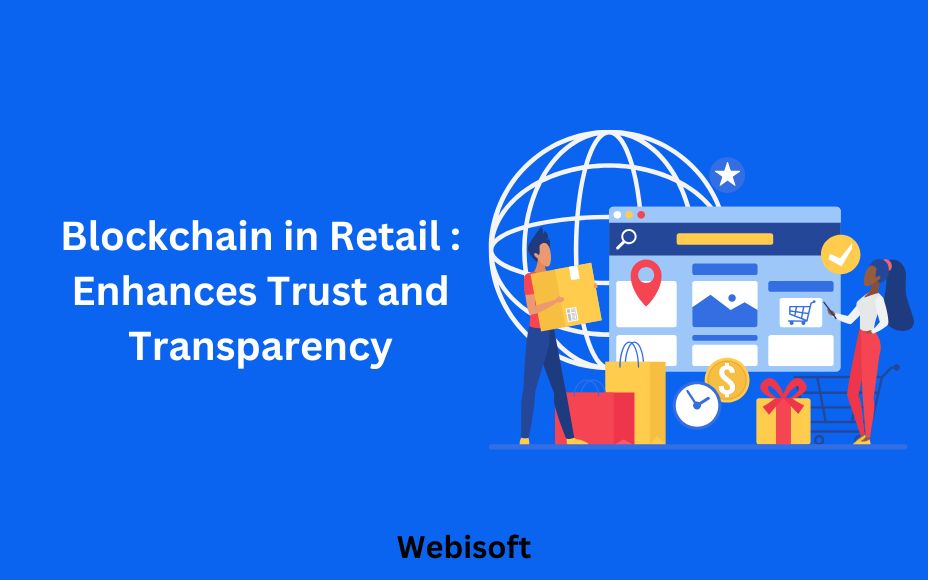The retail industry is constantly evolving, driven by ever-changing consumer expectations and the need for innovation. In this digital era, new technologies are reshaping the way retailers operate, and one such technology that has garnered significant attention is blockchain.
From supply chain management to product traceability, blockchain could revolutionize everything. At its foundation, blockchain is a decentralized, open ledger that safely archives and authenticates transactions. It reduces the demand for third parties, increases openness, and maintains data quality.
With that thought, we’ll explore the transformative potential of blockchain in retail. We will delve into the various applications of blockchain, highlighting real-world examples and success stories.
Moreover, we’ll examine the challenges and considerations involved in implementing blockchain solutions in the retail sector.
Contents
- 1 Blockchain’s Potential in the Retail Business
- 2 What are a Few of the Retail Industry’s Challenges?
- 3 How can Blockchain Technology be Used in the Retail Industry to Increase Transparency in the Supply Chain?
- 3.1 Stakeholders involved in Network of the Retail Supply Chain
- 3.2 Step 1: The producer puts the production information onto the blockchain
- 3.3 Step 2: Packagers Put the Packaging Data onto the Blockchain.
- 3.4 Step 3: Logistics Service Providers put the Carrier Data on the Blockchain
- 3.5 Step 4: Vendors and Wholesalers Put the Sales Information to the Blockchain
- 3.6 Step 5: Customers can Track the Whole Supply Chain Back to the Source
- 4 What are the Advantages of Applying Blockchain Technology in the Retail Industry?
- 5 Real-Life Example of Blockchain in Retail Supply Chain
- 6 Final Words
Blockchain’s Potential in the Retail Business
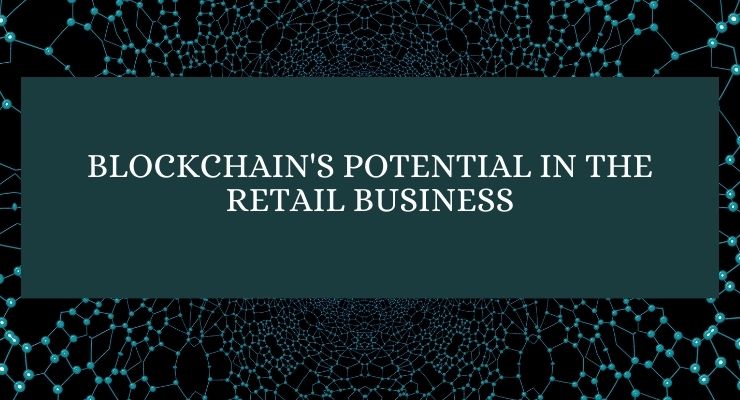
As consumer expectations continue to rise, retailers must adopt new strategies to remain agile, competitive, and deliver exceptional customer experiences. Among the array of innovative technologies, blockchain technology projects stands out as a game-changer with immense potential for the retail industry.
Retailers and consumers alike benefit from blockchain transparency, which reduces costs, mitigates risks, and fosters trust. Gartner says 20% of leading food retailers by 2025 will use blockchain to trace food, ensuring quality and improving production transparency.
The value generated by blockchain implementation in the supply chain is projected to reach a staggering $176 billion by 2025 and surpass $3.1 trillion by 2030.
A report by Deloitte highlights four major pain points in retail and consumer goods markets that blockchain technology can address:
- traceability
- compliance
- stakeholder relationship management
- flexibility.
Blockchain technology allows retailers to track products end-to-end, comply with regulations, enhance relationships with stakeholders, and adapt to the changing market. It’s going to revolutionize operations, foster trust, and propel business outcomes to new heights in the retail industry.
What are a Few of the Retail Industry’s Challenges?
Let’s look at a few challenges below —
Challenges in Inventory Management
Inventory management in the retail industry faces several hurdles. Currently, stakeholders store information in two different ways, making it difficult for others to access it.
On one hand, personal systems restrict information sharing, while on the other, centralized servers are vulnerable to hacks. Moreover, predicting sales has become increasingly complex due to the growing needs and intricacies of stock-keeping unit management.
Therefore, the traditional retail system requires an innovative solution to enhance its inventory processes.
Ensuring Authenticity
The retail industry is grappling with the issue of authenticity as it experiences rapid growth. This growth has led to an increase in fraudulent products.
According to a survey conducted by the Organization for Economic Co-operation and Development (OECD), in 2013 counterfeit goods cost about $461 billion.
The market has seen a rise in the sale of pirated goods due to a lack of information regarding the origin and production of raw materials. This lack of authenticity creates trust issues among stakeholders in the retail industry, which is a significant challenge.
Customers also worry about the quality and manufacturing of products. Blockchain uses in retail empowers consumers to scan a unique code etched onto a product, granting access to its comprehensive life cycle history.
Regulatory Compliance and Complex Contracts
The retail process involves signing various lengthy contracts, such as bills and sales agreements. These legal contracts often take a long time to finalize, causing delays in the overall process.
Blockchain technology has the potential to address the aforementioned challenges in the retail industry. Using blockchain, information can be shared and authenticity can be verified peer-to-peer, reducing the need for centralized authorities.
How can Blockchain Technology be Used in the Retail Industry to Increase Transparency in the Supply Chain?
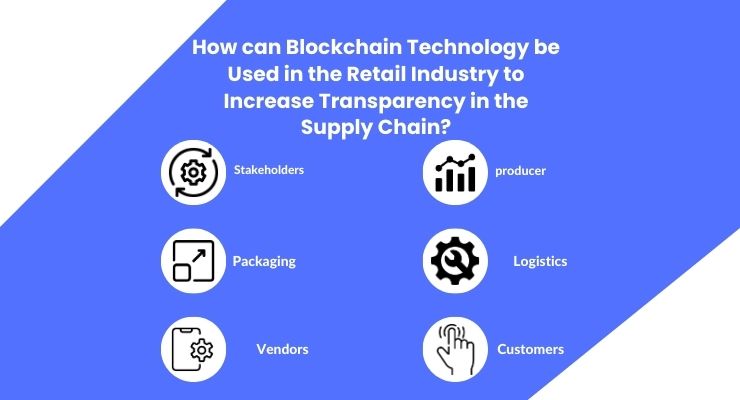
Stakeholders involved in Network of the Retail Supply Chain
In the Retail Supply Chain Network, there are several important stakeholders involved, such as the
- Manufacturer/Producer
- Packager
- Logistic Service Provider
- Wholesaler
- Retailer
- Consumer
And if you are considering integrating blockchain into your retail operations, our team of blockchain development experts at Webisoft is here to assist you.
Step 1: The producer puts the production information onto the blockchain
The first step in this network begins with the Producer, who adds crucial production details to the blockchain. These details encompass —
- the raw materials utilized
- the production origin
- manufacturing date
- manufacturing procedure
- the quality standards adhered to
By storing this information on the blockchain, it becomes accessible to all participants in the supply chain. The transparency brought about by these added details fosters fairness within the system, as it allows everyone to have access to the information.
Also, when a product passes quality tests, the quality assurance team can add a certification to the ID, which is securely stored on the blockchain.
Finally, the team of manufacturers is responsible for distributing the products to the packaging company, ensuring the smooth flow of the supply chain.
Step 2: Packagers Put the Packaging Data onto the Blockchain.
Once the manufacturing process is complete, the product makes its way to the packaging company. Their task is to enhance the product’s appearance and organization.
During the packaging phase, the packagers contribute crucial information to the blockchain. This includes the —
- type of carton box used
- the packaging date
- the materials employed in the packaging process
By adding these details, packagers ensure that retailers and consumers can trust the integrity of the packaging, assuring them that the product remains safe and untampered.
Upon successful packaging and inclusion of these details in the distributed ledger, a distribution request is initiated. The logistics service provider takes charge, ensuring the smooth transportation of the product to wholesalers and retailers in the supply chain.
Step 3: Logistics Service Providers put the Carrier Data on the Blockchain
To ensure smooth transportation of the products to the wholesalers, logistic service providers play a vital role. They utilize IoT-enabled vehicles equipped with various sensors.
During the shipping process, these service providers add crucial carrier details to the blockchain. This information includes —
- the quantity of products to be delivered
- the classification of products (non-fragile/fragile and food products)
Moreover, the IoT-enabled vehicles are equipped with sensors that directly transmit valuable data to the blockchain. This data includes —
- Keeping the items in the vehicle at a certain temperature
- Updates on location in real time
Wholesalers and vendors can verify the accuracy of the delivered product quantity by sharing this information with transportation service providers. Thus, it ensures that the items were stored at the appropriate temperature throughout the journey.
Step 4: Vendors and Wholesalers Put the Sales Information to the Blockchain
Wholesalers and retailers play a crucial role in the supply chain, and they have the ability to add sales-related information to the blockchain. This includes details such as
- Purchased or sold products
- Price at retail maximum
- A product’s selling price
Including this information in the distributed ledger enhances the system’s transparency and trustworthiness.
Retailers can now easily track the number of products sold or available, greatly enhancing their inventory management systems. Additionally, auditors and government bodies can leverage the blockchain for streamlined and efficient taxation audits. The blockchain brings convenience and ease to the auditing process.
Step 5: Customers can Track the Whole Supply Chain Back to the Source
The implementation of a Blockchain Supply Chain solution in retailing greatly improves the trust relationship between consumers and retailers.
Currently, consumers can trace a product’s entire lifecycle along the supply chain because of the transparency embedded in retail operations.
By using a blockchain-based application, they can easily verify whether the product was manufactured correctly and if it has passed the necessary quality checks.
The benefits of blockchain in retail extend beyond traceability. It streamlines product life cycles, improves inventory management, facilitates secure payments, and protects consumer info. By addressing these business challenges, blockchain technology revolutionizes the retail industry.
What are the Advantages of Applying Blockchain Technology in the Retail Industry?
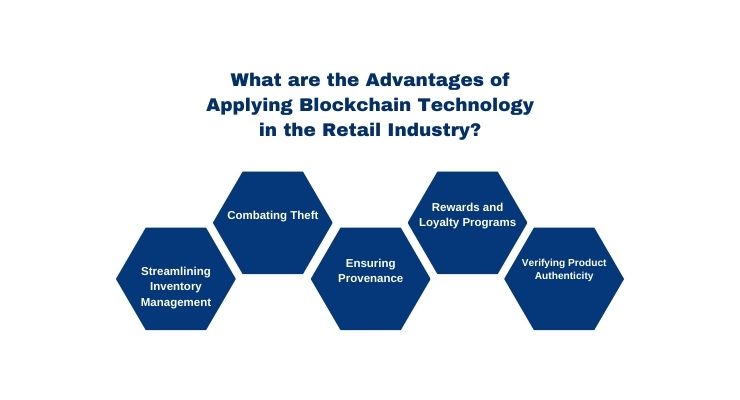
The benefits of blockchain applying in the retail sector are immense. Some of them are —
Streamlining Inventory Management
As retailers face the challenge of managing an ever-growing array of Stock Keeping Units (SKUs), sales forecasting has become increasingly complex.
To address this, blockchain technology can store a wealth of real-time information, including product origin, production and sales figures.
This comprehensive data repository empowers retailers to efficiently track product availability, greatly enhancing inventory management processes.
Combating Theft
The involvement of multiple stakeholders in the retail supply chain also raises concerns about theft. With the aid of Internet of Things (IoT) sensors capturing data at every step, blockchain becomes an invaluable tool for creating permanent records.
These records enable the detection of thefts at any point along the chain, thereby mitigating losses. It’s estimated that cargo thefts cost the FBI $30 billion a year, so blockchain’s theft detection potential is invaluable.
Ensuring Provenance
Blockchain offers a solution to bolster trust for grocery retailers specializing in organic and GMO-free food products.
It addresses consumer skepticism regarding the authenticity of organic labels and pricing strategies. Customers can trace a product’s journey from its manufacturer to its retailer by implementing blockchain within supermarket chains.
This provenance tracking instills confidence in consumers, reinforcing the integrity of the organic food market and dispelling doubts surrounding pricing strategies.
Enhancing Customer Rewards and Loyalty Programs
Every year, US businesses issue a staggering $117 billion in customer rewards and loyalty programs to enhance satisfaction and reduce liabilities. However, for consumers, keeping track of multiple loyalty programs and unused points can be a challenge.
Implementing a blockchain-based application can revolutionize this process, allowing users to redeem points seamlessly across various channels and platforms. This not only reduces liabilities and increases customer satisfaction but also lowers operating costs and minimizes the risk of fraud.
Verifying Product Authenticity
Integrating blockchain in retail empowers consumers to scan a unique code etched onto a product, granting access to its comprehensive life cycle history.
This innovative approach revitalizes trust and strengthens customer relationships by providing transparent proof of a product’s authenticity.
With blockchain technology, retailers can forge stronger connections with their customers, instilling confidence and loyalty in the products they purchase.
Real-Life Example of Blockchain in Retail Supply Chain
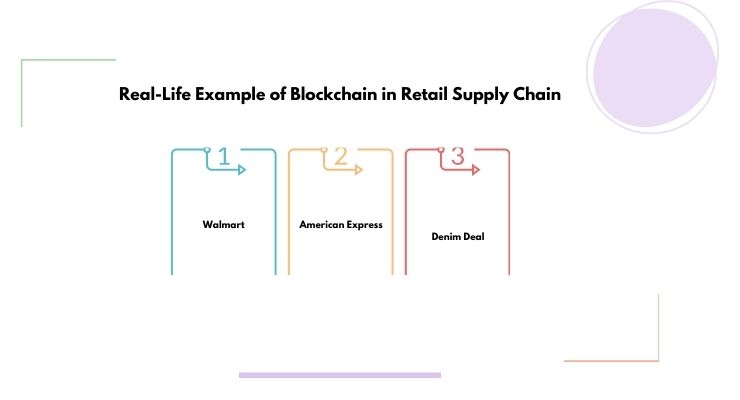
Let’s dive into a few realistic application of block ledger in retail supply chain —
Walmart
Walmart recognized the potential of blockchain technology in creating a decentralized food supply chain that could effectively trace food sources and prevent food-borne diseases.
To test this concept, Walmart joined forces with IBM and conducted two proof-of-concept projects:
- Mangoes sold at Walmart shops in the United States are being traced.
- Tracing pork sales at Chinese Walmart shops.
The results were highly promising.
In China, certificates of authenticity were uploaded to the blockchain, instilling trust in the system.
In the US, the time required for tracing was significantly reduced from 7 days to a mere 2.2 seconds.
This successful implementation utilized Hyperledger Fabric as the underlying blockchain technology.
Today, Walmart employs this blockchain solution to trace the origins of over twenty-five different products. Furthermore, Walmart has plans to expand this system to encompass even more products in the near future.
This transition to blockchain technology holds the potential to revolutionize retail operations. Blockchain-based solutions establish trust between consumers and retailers, as well as throughout the entire retail supply chain.
American Express
Recognizing the limitations of traditional loyalty programs, American Express introduced Plenti, a unique rewards program referred to as a “loyalty coalition business.”
Plenti was based on a simple but powerful idea: allow customers to earn loyalty points at one retailer and redeem them at another. However, after just two years, partnering merchants began to withdraw from Plenti, signaling its impending downfall.
The issue stemmed from consumers taking advantage of the system’s flexibility. Plenti users collected loyalty points easily at gas stations and spent them at retailers like Macy’s, where a broader range of products was available.
Essentially, Plenti’s rewards program directly competed with retailers’ own loyalty initiatives. The root cause of this problem lay in the underlying network, which lacked a consensus on program structure.
In response, American Express swiftly partnered with Hyperledger, a blockchain technology provider. Together, they developed a blockchain-based system that empowers merchants to create customized Membership Rewards programs for American Express cardholders.
This solution allows merchants to associate American Express reward points with their own products as they see fit. It’s a win-win situation: merchants regain control over their offers, while customers enjoy a diverse range of promotions.
Crucially, Hyperledger’s blockchain technology significantly expedites the onboarding process for merchants, taking only weeks compared to the months required by conventional APIs.
With Hyperledger, American Express illustrates its commitment to leveraging blockchain to improve loyalty programs.
Denim Deal
Hey, did you know that making a single pair of jeans can use up to a whopping 7,600 liters of water?
Yeah, it’s pretty shocking, right? This is why the production of fresh, or “virgin,” denim is seen as a big environmental issue. Stores that sell jeans are always on the lookout for ways to reduce this environmental strain.
There’s this amazing group called Denim Deal. They’re not just one or two people, but a powerful network of over 40 partners, which includes the people who make the denim, the ones who make the rules, and even the ones who recycle. Together, they’re trying to lower the environmental impact of making denim.
Now, meet Circularise, a cool company that’s an expert in creating solutions for supply chains using blockchain technology. They came up with something called Aware. The goal?
To help Denim Deal in its quest for sustainable denim production. With Aware, it’s possible to confirm that at least 5% of your jeans are made from recycled materials. Sounds cool, doesn’t it?
So, how does it all work? Well, it starts with adding tiny traceable particles to the recycled fabrics. These particles mix with the recycled cotton and then, in the world of blockchain, they become tokens.
These aren’t your usual tokens though; these are fabric tokens. They then take these tokens and turn them into the denim material used for jeans.
To check if these tokens are present in the finished jeans, Aware has a special hand-held scanner. All it needs to do is give the jeans a quick scan. And voila! We have a way of producing and verifying recycled denim.
By including tokenized particles in the final product, Denim Deal ensures that the jeans are made from recycled materials. Due to Aware’s unique particles’ versatility, different types of clothing and accessories can be tracked using blockchain technology by mixing them with different fabrics.
With Aware, retailers can contribute to sustainability while appealing to environmentally-conscious consumers looking for brands who care about the planet. Denim Deal and Aware together pave the way for a more sustainable future in denim production.
Final Words
In conclusion, the advent of blockchain in retail has opened up a world of possibilities for the industry. Whether it’s supply chain management or customer loyalty programs, blockchain has the potential to revolutionize retail.
Using blockchain technology, retailers can increase trust, streamline operations, and provide personalized customer experiences. Implementing blockchain in retail requires careful consideration and strategic planning, but the benefits are significant.
As the retail industry continues to evolve in the digital age, the integration of blockchain solutions will become increasingly crucial. Blockchain can put businesses at the forefront of innovation and help them stay competitive.Webisoft, a leading blockchain development solution, can play a crucial role in implementing blockchain in retail. With our expertise and experience in blockchain technology, we can assist retailers in designing and deploying customized blockchain solutions tailored to your specific needs.
